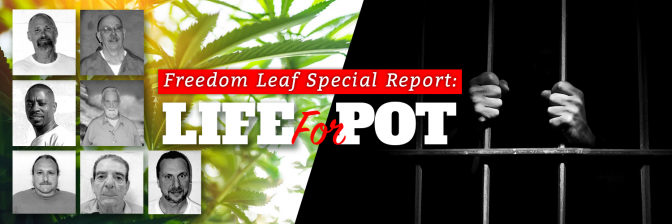Freedom Leaf Special Report: Life For Pot


Craig Cesal
Craig Cesal thought there was no possible way a judge could sentence a first-time offender, who did nothing more than recover and repair trucks that had previously hauled marijuana, to serve a life sentence without parole. Cesal was wrong.
Some of the trucks he was called on to retrieve had been used to smuggle drugs. The abandoned truck Cesal recovered in Gainesville, Ga. in 2002 had no marijuana in it; the cargo had been seized at the Mexican border. Nonetheless, he was charged with conspiracy to distribute marijuana.
It always shocks the public—even the marijuana-consuming public—to learn that there are actually people serving life sentences for nonviolent marijuana offenses, right here in the so-called “land of the free.” Once this fact settles in, many people jump to all kinds of logical-sounding yet inaccurate conclusions: The prisoner must have been importing tons of marijuana, been violent or had some serious prior offenses, or perhaps “three strikes” came into play.
It’s true that some marijuana lifers imported lots of weed. But in many cases, the defendant was a minor player and was never caught with so much as a single seed—what prisoners call “ghost dope.” Some people like Cesal and John Knock, who received not one but two life sentences for conspiracy, were first-time offenders. And while there are violent offenders serving life sentences for cannabis, none of the men represented by the Marijuana Lifer Project, a non-profit organization I founded in 2016 to advocate for these prisoners, had any violence charges brought in their cases.

John Knock
Once people learn that nonviolent prisoners are serving life for pot, some assume that these prisoners must be relics of a bygone era, when the U.S. used to give out long sentences for marijuana. Since the majority of the marijuana lifers are now senior citizens who’ve been incarcerated for decades, it’s easy to see how this misconception got started. This, too, is inaccurate: In 2014, Corvain Cooper received his sentence of life without parole; and two others were sentenced to life in 2016.

Corvain Cooper
The believability factor surrounding this issue has been one of the toughest obstacles I’ve had to fight as an advocate; it’s all so incredible that most people simply don’t believe it. When you tell the average person that someone is serving a life sentence for pot, they naturally assume there must be a dead body somewhere. And while it may seem logical that this would be necessary in order to receive such a harsh sentence, sadly our elected leaders see nothing wrong with locking up nonviolent offenders for the rest of their natural lives in order to “protect” U.S. citizens from the horrors of marijuana.
The reality is, a conspiracy charge earned the majority of the marijuana lifers their egregious sentences. This word scares the general public, but it shouldn’t; nearly everyone reading this article could be guilty of a conspiracy. All it means is you know someone involved in, or knew something about, a “crime.”

Leopoldo Hernandez-Miranda
The law holds everyone involved in a conspiracy equally responsible, regardless of how much or how little they actually participated. This is how Leopoldo Hernandez-Miranda, a Florida day laborer who watched over a storehouse of marijuana, ended up serving life without parole.
No physical evidence is needed for a prosecutor to win a conspiracy conviction. All it takes is the testimony of another “co-conspirator,” who most likely is also trying to avoid prison time. This explains how, in many cases, the true “kingpins” these laws were designed to protect the public from end up serving little or no jail time, while minor players like Cesal and Hernandez-Miranda end up with life sentences.

Paul Free
The system is designed for defendants to take plea deals; anyone who stands their ground and exercises their 6th Amendment right to a trial and loses is punished far more severely than if they’d simply copped a plea in the first place. The deck is severely stacked against these defendants.
For marijuana lifer Paul Free, admitting guilt by taking a deal and incriminating others was never an option. He’d been offered a plea deal numerous times, but it involved testifying against others, some of whom he was acquainted with, and some he’d never known, seen, met or even heard of. Free told me, “What good is life if you can’t look at yourself in the mirror?”
Now 66, and in his 22nd year of incarceration, Free was one of the lucky ones on President Obama’s pre-Christmas clemency list. Unlike a handful of other marijuana lifers who also won the “clemency lottery,” Free will not see immediate release; instead, Obama reduced the Coronado, Calif. native’s life-without-parole sentence to 30 years. With time off for good behavior, he could be free by 2020.
Even luckier are some of the other lifers I’ve advocated for who gained freedom via a stroke of the president’s pen before he left office. Former Marine Billy Dekle, Charles Cundiff, Alberto Rosales and Craig Frazier were all released to either halfway houses or home confinement within weeks or, in some cases, days of getting the good news. Zionist Coptic priest James Tranmer, 73, who considered his incarceration religious persecution, also made it to Obama’s final round of clemencies. Announced the day before the Trump inauguration, Tranmer felt “overwhelmed” by the news that he would finally reunite with his family after 24 years behind bars.
President Obama, in comparison to his predecessors, was generous in granting clemencies. According to the Justice Department, the Obama administration received 31,149 clemency petitions; 1,715 were granted (including 504 life sentences). However, only a tiny percentage of these were for marijuana-only crimes. By comparison, Obama’s predecessor, George W. Bush, granted just 189 petitions.
In the four years since I began doing this work, 11 lifers I’ve personally worked with have been granted clemency or were released through other legal maneuvers. For an activist like myself, there’s no greater reward. At the same time, it’s difficult to fathom the logic that’s left so many other deserving prisoners between bars.
Most shocking of all for me was when 81-year-old first-time offender Antonio Bascaro, the world’s longest-serving marijuana prisoner, received a clemency petition denial letter. A Cuban war hero who has served 37 years of a collective 70-year sentence (some sentences served concurrently) for his part in a marijuana conspiracy, Bascaro will go to home confinement release in a year and a half, if he makes it that long.
Another mystery is what will happen to Michael Pelletier, 60, a wheel-chair-bound paraplegic who’s serving life without parole for his part in a cannabis conspiracy. Unlike the other marijuana lifers who either were granted clemency or received a denial letter, Pelletier got neither. He continues to wait in limbo at USP Terre Haute, the maximum-security federal penitentiary in Indiana.

Michael Pelletier
Perhaps the biggest question of all is what, if anything, will occur to correct these injustices under the Trump administration, especially with notorious drug warrior Jeff Sessions serving as Attorney General. While clemency remains the best and sometimes only hope for those serving life sentences for marijuana, the only certainty going forward is that activists will continue to fight, and prisoners and their families will continue to hope and pray for freedom.
If you enjoyed this Freedom Leaf article, subscribe to the magazine today!


